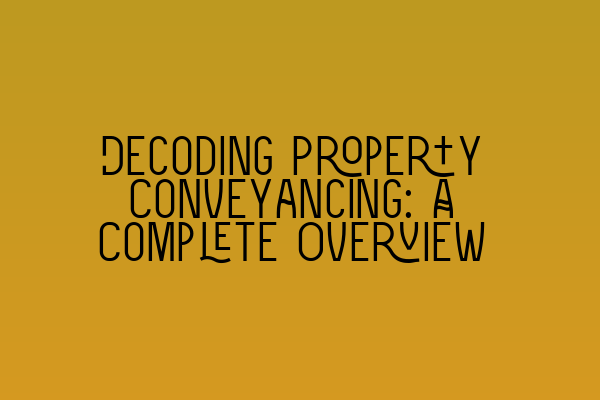Decoding Property Conveyancing: A Complete Overview
Welcome to SQE Property Law & Land Law, where we aim to provide you with a comprehensive understanding of property conveyancing. Whether you are a first-time homebuyer, a seasoned property investor, or a legal professional looking to brush up on your knowledge, this blog post will serve as a valuable resource to decode the complexities of property conveyancing.
Before we dive into the nitty-gritty details, let’s start with a brief definition: property conveyancing refers to the legal process of transferring ownership of a property from one party to another. Whether it’s buying or selling a residential or commercial property, conveyancing involves a series of steps to ensure a smooth and lawful transfer.
Now, let’s break down the property conveyancing process into manageable stages:
1. Pre-Contract Stage:
This stage involves preliminary steps such as conducting property searches, obtaining planning and building control documents, and investigating the property’s title. Our related article on SQE 1 Practice Exam Questions can help you prepare for the legal exams associated with property conveyancing.
2. Contract Stage:
Once the pre-contract stage is complete, a legally binding contract is prepared. This contract outlines the terms and conditions of the sale, including the purchase price, completion date, and any special provisions. It is essential to have a skilled solicitor review and negotiate the contract on your behalf to protect your interests.
3. Exchange of Contracts:
During this stage, both parties sign and exchange the contracts, making the transaction legally binding. At this point, a deposit is usually paid by the buyer, and a completion or settlement date is agreed upon.
4. Pre-Completion Stage:
In the lead-up to the completion date, various tasks are carried out, such as conducting final searches, obtaining mortgage funds, and arranging for property insurance. Our related article on SQE 1 Practice Mocks FLK1 FLK2 can assist you in practicing mock quizzes to test your knowledge.
5. Completion Stage:
On the agreed completion date, the balance of the purchase price is transferred to the seller’s solicitor, and ownership of the property is legally transferred to the buyer. This stage often involves the presence of both parties’ solicitors and may include handing over the keys to the new owner.
6. Post-Completion Stage:
After completion, several post-completion tasks need to be addressed, such as registering the property with the Land Registry, paying Stamp Duty Land Tax (SDLT), and notifying relevant parties of the change in ownership. Expert advice from our specialist solicitors can be invaluable during this stage.
Now that you have a broad understanding of the property conveyancing process, it’s important to note that the intricacies of conveyancing can vary depending on the type of property and its location. Factors such as leasehold vs. freehold, shared ownership, commercial property, and new builds can introduce additional complexities into the process. Our team of experienced solicitors at SQE Property Law & Land Law is well-equipped to handle any unique requirements that may arise.
If you’re a legal professional looking to enhance your knowledge in property conveyancing, we offer comprehensive SQE 2 Preparation Courses and SQE 1 Preparation Courses designed specifically to cover the concepts and skills required for success in the SRA’s SQE exams. Check our SRA SQE Exam Dates to plan your study schedule accordingly.
In conclusion, property conveyancing involves a series of stages to ensure a smooth and legal transfer of property ownership. Whether you’re a homebuyer, property investor, or legal professional, understanding the conveyancing process is crucial. At SQE Property Law & Land Law, we offer expert guidance and support throughout the entire conveyancing journey. Feel free to reach out to our team for assistance or further information.
This blog post has been brought to you by SQE Property Law & Land Law, your trusted solicitors specializing in property conveyancing and land law matters.
